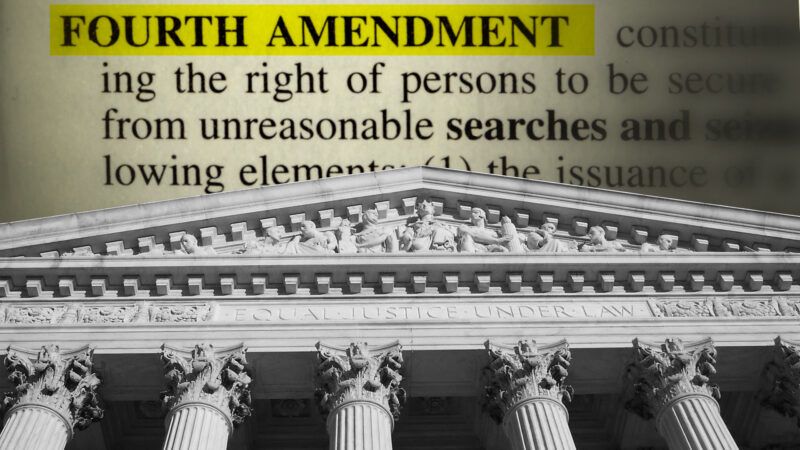Do Cops Still Need a Warrant To Search Your Home in an 'Emergency'?
SCOTUS will soon decide.

You're probably familiar with the old adage that "a man's home is his castle." It's the idea that agents of the state may not lawfully enter your home uninvited for any reason that suits them; rather, the state's agents must have a legitimate and verifiable cause. James Madison and his colleagues wrote this view into the U.S. Constitution via the Fourth Amendment, which famously protects "the right of the people to be secure in their persons, houses, papers, and effects, against unreasonable searches and seizures."
This fall, the U.S. Supreme Court will hear oral arguments in a case that involves the modern application of that adage and its venerable constitutional corollary. Depending on the outcome, it may prove to be one of the most consequential Fourth Amendment cases in years.
You’re reading Injustice System from Damon Root and Reason. Get more of Damon’s commentary on constitutional law and American history.
At issue before the Supreme Court this fall in Case v. Montana is the following question: "whether law enforcement may enter a home without a search warrant based on less than probable cause that an emergency is occurring, or whether the emergency-aid exception requires probable cause." In other words, at what point may police officers enter your home without a warrant if they think that an emergency might be happening inside?
The matter arose in 2021 when the ex-girlfriend of a man named William Trevor Case told the authorities that Case had threatened to kill himself during a phone call with her. The cops showed up at Case's house but nobody answered the door. Looking through a window, they saw empty beer cans, a notepad, and an empty handgun holster. After debating among themselves for some 40 minutes about what do to next, the cops finally decided to enter without a warrant via the unlocked front door. (I pause here to note that 40 minutes does sound like a sufficient amount of time for the police to at least try to get a search warrant.)
Case was upstairs hiding in a closet. When he revealed himself by opening the closet's curtain, the officer who was searching the room shot him, striking Case in the abdomen. Case was thus shot by a cop, even though the cop had entered Case's home without a warrant for the ostensible "emergency" purpose of preventing Case from shooting himself.
Case was later charged with assault on that officer, with the charge ultimately amended to state that Case "knowingly or purposefully caused reasonable apprehension of serious bodily injury in Sgt. Richard Pasha when he pointed a pistol, or what reasonably appeared to be a pistol, at Sgt. Richard Pasha."
Case's lawyers sought to have the evidence used against him ruled inadmissible on the grounds that it was the fruit of an "illegal search and seizure of [Case] and his residence." But the Montana Supreme Court ruled against Case, stating that "while an individual is entitled to a right to privacy in their home, a warrantless entry is permissible if it is reasonable given the facts and circumstances." The U.S. Supreme Court will now decide whether the state high court's judgment can be reconciled with the Fourth Amendment.
Given the significant constitutional stakes involved, it is no wonder that this case has already attracted the keen interest of prominent civil liberties groups from across the political spectrum. For instance, among those who have filed amicus briefs in support of Case are the libertarian Cato Institute, the liberal American Civil Liberties Union, and the Conservative Legal Defense and Education Fund.
These groups may disagree with each other on plenty of other legal issues, but they are in agreement here that Case's Fourth Amendment rights were abused. As the brief filed by the Cato Institute and Americans for Prosperity Foundation put it, "Warrantless home entries based on mere reasonable suspicion of exigent circumstances violate the Fourth Amendment and needlessly threaten the safety of citizens and law enforcement. If Montana police did not have probable cause to enter Case's home, their search should be declared unconstitutional."
We'll soon find out whether a majority of the justices agree with that assessment or whether they prefer the Montana Supreme Court's more lenient interpretation of what counts as "reasonable" behavior by the cops.
